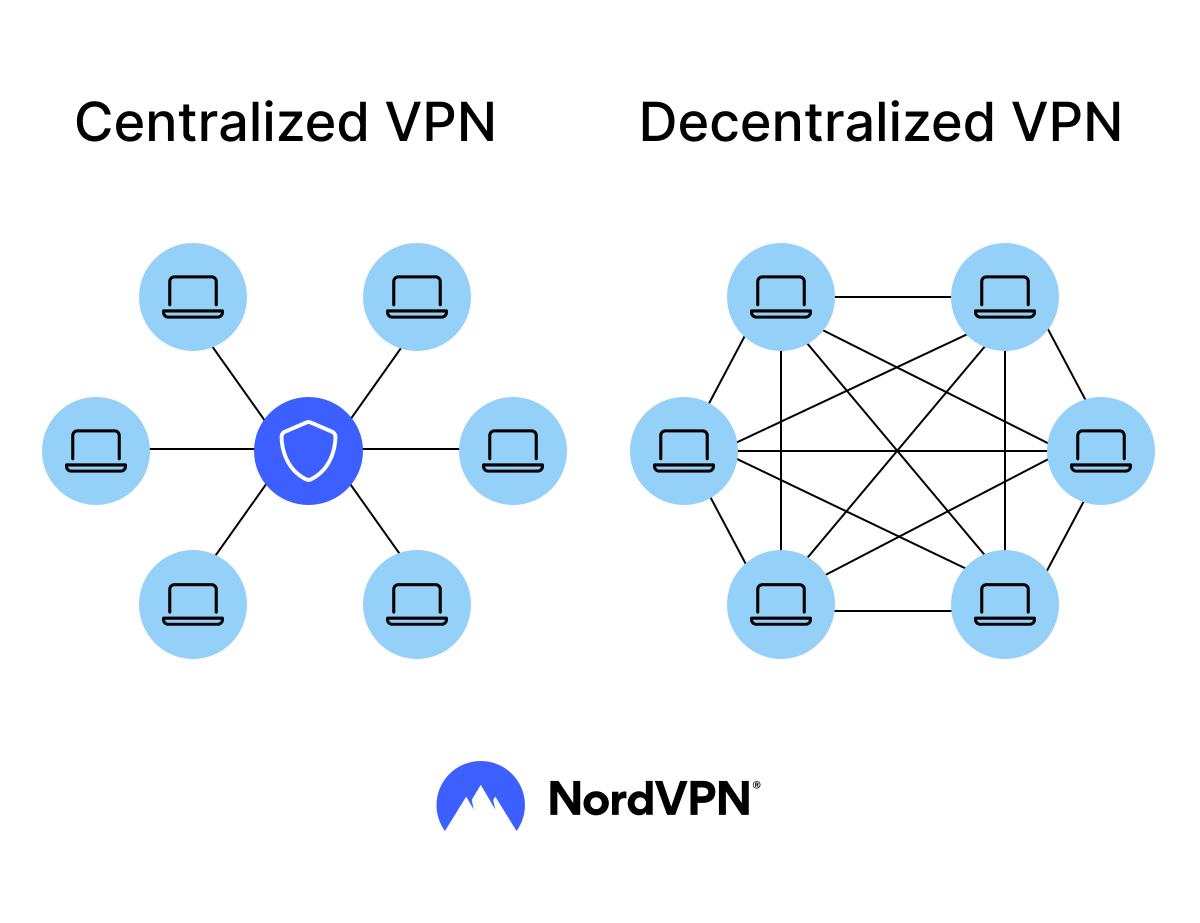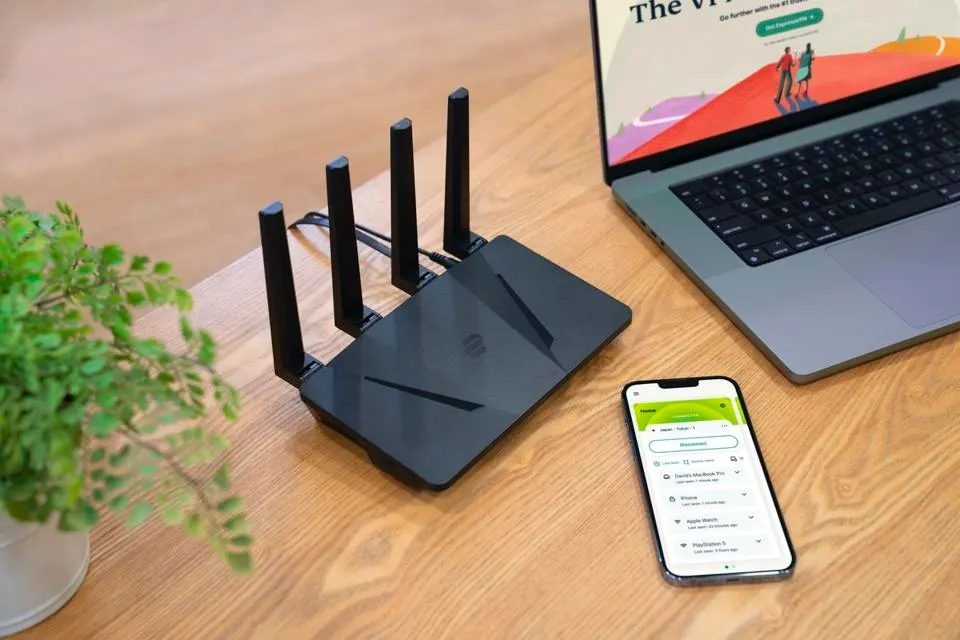Virtual private networks, or VPNs, are one of the most effective ways to keep your data private and secure while online. They encrypt and hide our confidential web activity and are a key component in helping us to navigate safely while connected to the internet.
As VPN usage continues to increase globally these apps are quickly becoming a cornerstone of our online security. Due to this importance, it’s worth looking at what’s in store for the next-gen VPNs to see how they’ll continue to provide us privacy and security into the future.
From VPNs utilizing blockchain to new encryption standards even quantum computers can’t break—and maybe even anonymity for your smart appliances—here are the coming advancements in VPN tech I’m most excited for.
Further reading: Best VPN services 2024: Top picks for speed, price, privacy, and more
Blockchain technology is coming to VPNs

The decentralized node structure of a dVPN may be the way of the future.
NordVPN
Decentralized VPNs, or dVPNs, offer a new twist on VPN technology and they are quickly growing in popularity. By distributing network functions across many nodes rather than routing traffic through one company’s centralized servers, they can theoretically afford better privacy and security to users.
A dVPN runs on a peer-to-peer network that leverages blockchain technology. Decentralized nodes, operated by volunteer hosts, eliminate single points of failure and ensure that no single entity has control over every user’s data. Due to a dVPN’s more democratic functioning, they are also seen as being more resistant to censorship and government data sharing.
Just over the last year or two, decentralized VPNs have started to gain traction in the global market. So does this mean crypto bros are about to take over your VPNs? Not likely. While dVPNs certainly seem like an attractive offer, more so with all of the hype surrounding everything crypto and blockchain nowadays, this decentralization doesn’t inherently mean a better experience.
With a traditional VPN, you have to put your trust in just one company. But this company, assuming you choose wisely, will run regular audits to prove it’s trustworthy, has a vested interest in keeping its network secure, and has the financial backing to continually make improvements to its applications.
Using a dVPN on the other hand means that you have to trust each volunteer node host. Depending on how the dVPN company operates, these hosts may not be required to prove their trustworthiness or the privacy of their nodes.
So, while dVPNs are sure to become a popular choice for those seeking decentralized privacy, there will still be a place for traditional VPNs in the future. What is most likely is that you’ll see two separate markets develop, one for dVPN services and another for traditional centralized VPN services. It will then be up to you as the user to choose which you believe is best suited to protect your data.
The post-quantum encryption revolution is upon us

Post-quantum encryption will become the new standard for VPNs in the near future.
Pixabay
In August of this year, the National Institute of Standards and Technology (NIST) made history by releasing the first quantum-resistant encryption standards. Outside of a few overly enthusiastic cryptographers, this news might not have made a splash but it’s set to have huge implications for the future of online privacy and security.
Researchers and tech companies are racing to build quantum computers that will have the capability to crush the encryption standards of today’s machines in mere minutes—something currently impossible.
So, how does this relate to VPNs? Well, VPNs are heavily reliant on cryptographic protocols for securing communication on their networks. When you connect to a VPN, it encrypts your traffic by scrambling the data into an unreadable form, thereby preventing third parties from viewing and understanding that data. If a quantum computer with vastly greater computational power were to get ahold of this same encrypted data, it could decipher it with ease.
These new ‘post-quantum’ encryption standards will not only set the bar for VPN providers in the coming years, but also provide a roadmap to help them become more secure. “Post-quantum” encryption will become a selling point that VPNs will advertise and market to consumers.
For users, it might seem like a boutique feature now, but once quantum computers are up and running—most experts believe it could be within the next decade—you’ll absolutely want your VPN to be using these new standards.
We’re already seeing some VPN providers offer ‘post-quantum’ encryption. Just recently NordVPN took the initiative and launched an app with post-quantum support. Others such as ExpressVPN and Surfshark have also implemented their own versions as well. It’s only a matter of time before this becomes the new norm for all VPNs.
VPNs will soon protect your refrigerator, too
The all encompassing internet of things, or IoT, refers to a network of connected devices that communicate and share data with each other. For most people, this takes the form of smart home devices such as thermostats, TVs, lights, refrigerators, and home security systems. Thanks to IoT devices we now have more control over our environment than ever before.
When it comes to cybersecurity however, smart devices are generally some of the most vulnerable and least protected pieces on your home network. Cybercriminals love to exploit IoT devices and in many cases, simply hacking one device will give them access to everything else.
VPNs are out to change this in the near future. By providing fully integrated home network security, a VPN can encrypt and protect communications for all of your devices. Unlike the typical personal VPN that requires you to connect each individual device, IoT VPNs extend across an entire network to safeguard all devices. At home this can already be done via a router VPN.
Unfortunately, there are still a few drawbacks to using a router method. Many VPN providers still impose simultaneous device connection limits that can be taken up quickly by all of your IoT devices. Router VPNs also create a single point of failure meaning you need to make sure failsafes, such as an automatic killswitch, are set up correctly. This all requires a bit of technical know-how which the average layperson may not have.

Routers with built-in VPNs, like Aircove from ExpressVPN, are just one of the ways that next-gen VPNs will protect all of the devices on your home network.
ExpressVPN
VPN companies are working on new and innovative solutions for at-home IoT coverage. More and more services are switching over to unlimited device connection models. Others such as ExpressVPN have even started selling their own routers, ready to go right out of the box, with the VPN built into them.
VPNs are likely to begin offering configurable IoT options in their mobile apps as well. This will allow users to easily control which devices on their home network are connected through the VPN, all in a centralized hub. So in the future, even the AI-generated grocery list from your smart fridge will be encrypted and secure from prying eyes.
This articles is written by : Fady Askharoun Samy Askharoun
All Rights Reserved to Amznusa www.amznusa.com
Why Amznusa?
AMZNUSA is a dynamic website that focuses on three primary categories: Technology, e-commerce and cryptocurrency news. It provides users with the latest updates and insights into online retail trends and the rapidly evolving world of digital currencies, helping visitors stay informed about both markets.
